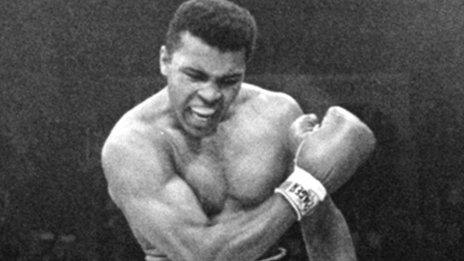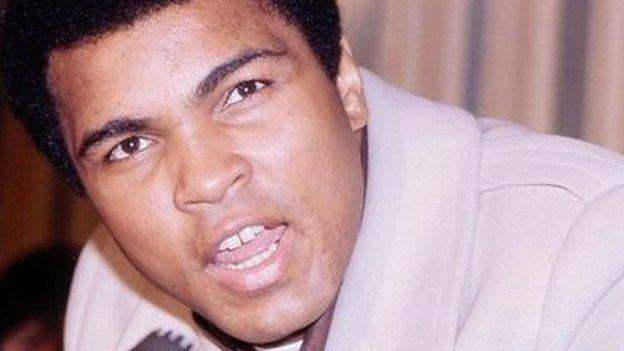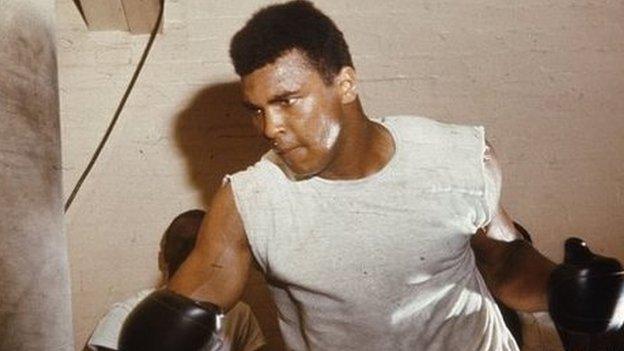Muhammad Ali at 70: Bill Clinton hails Ali's worldwide impact
- Published
Clinton praises Ali courage
Muhammad Ali's talent, charisma and strong principles were responsible for raising boxing's popularity across the world, according to former US president Bill Clinton.
Clinton also credited Ali, who turned 70 on Tuesday, with helping pave the way for Barack Obama to become the country's first black president, external.
"He made millions of people believe. He was something unique," said Clinton.
Three-time world heavyweight champion Ali won 56 bouts over a 21-year career, external.
He also made plenty of headlines outside of the ring with his sharp words and refusal to take part in the Vietnam War.
But Clinton believes his fellow American's legacy will be the way he got the whole world talking about boxing again in the 1960s.
"People had moved away from boxing. It was a huge deal in America in the 1940s and 1950s and then they wrote it off," he told BBC Sport boxing commentator Mike Costello.
"Then here comes Muhammad Ali, first as Cassius Clay, looking like a ballerina in the boxing ring - reminding people it was a sport.
"He made it exciting and meaningful again. He was entertaining and when he was younger he was always mouthing off. But it was part of his schtick.
"He made it part theatre, part dance and all power."
Ali risked his glittering career, and his reputation, to oppose the Vietnam War, external. He refused to serve in the US Army when he was called up for service and was subsequently arrested for committing a felony.
Boxing authorities suspended his licence and stripped him of his titles before he was found guilty of the offence after a 1967 trial. The US Supreme Court reversed the conviction four years later.
"It could have destroyed him but it didn't - because people realised he had been very forthright and he was prepared to pay the price for his convictions," said Clinton. "On balance he won more admirers than detractors."
Ali's success helped break down racial barriers in the US and create the path which eventually led to President Obama's election in 2008, according to Clinton.
"All those people from the Civil Rights years and also every African-American who did everything that destroyed the old stereotypes have helped," said Clinton, 65.
"There was nothing inferior about Ali - he was superior on merit without regards to his race when it came to what he loved.
"All this stuff played a role. Society changes slowly, like icebergs turning in the ocean. Sometimes great symbolic events affect changes of consciousness of a whole country. Ali reflects a lot of that."
British broadcaster Sir David Frost, who famously verbally sparred with the boxer during television interviews at the height of his fame, believes Ali touched the hearts of millions with his words.
He said: "Over the years Muhammad Ali spoke with peace. Not just for boxing but peace in general.
"Although he spoke in this war-like rhetoric, it was already clear that the man beyond that rhetoric was a warm and friendly and peaceable man.
"He became the most famous man in the world for a long time. He's not far off it now even."
Legendary boxer Joe Bugner gave a tribute to Ali on Radio 5 live.
Former British and Commonwealth heavyweight champion Joe Bugner fought Ali in 1973 and 1975, losing on points on each occasion. He told BBC Radio 5 live Breakfast: "It was a great pleasure to fight him on both occasions.
"He was more of an athlete than a fighter. He was a highly intelligent athlete, who utilised every inch of the boxing room."
Frank Bruno insists the world will never see another boxer like Ali, whom he believes put "boxing on the map".
"He paved the way for boxers like myself to want to go into boxing and make a living for themselves," said Bruno.
"We're grateful we had Muhammad Ali to inspire us."
David Haye, who won the WBA heavyweight crown in 2009, external, added: "I believe he is the world's greatest ever athlete bar none."
Archive: Muhammad Ali
- Published17 January 2012

- Published4 June 2016

- Published4 June 2016

- Published4 June 2016